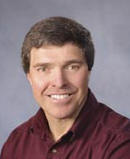 If you are an average adult, you probably qualify for being a time-pressured person. That is, you most likely have more things to do than you have time to do them. If this is the case, one of the things you may not do that you should do is exercise.
If you are an average adult, you probably qualify for being a time-pressured person. That is, you most likely have more things to do than you have time to do them. If this is the case, one of the things you may not do that you should do is exercise.
It is an unfortunate fact that 6 out of 10 adults lead totally sedentary lifestyles. Even more problematic, only 1 out of 10 adults performs sufficient physical activity to attain measurable fitness benefits. No wonder a recent Ohio University study showed that 75 percent of American adults are overweight. Approximately the same percentage of men and women will experience low back pain, and about 50 percent will die from heart disease.
Perhaps because it doesn't take time, dieting is the preferred approach to weight loss for many people. According to a Tufts University study, 1 out of 2 women and 1 out of 4 men are presently dieting to reduce their bodyweight. Although low calorie diets may produce temporary results, the 33 billion dollars spent annually on diet programs has proved unsuccessful for permanent bodyweight improvements.
But why do less than 10 percent of dieters keep the weight off? Because keeping fat off is closely related to keeping muscle on. You see, average adults have two problems. One, they are adding about 15 pounds of fat every decade of life. Two, they are losing about 5 pounds of muscle during the same time period. So what the bathroom scale registers as a 10-pound weight gain actually represents a 20-pound change in body composition. If the body were a car, this would be analogous to driving a bigger automobile with a smaller engine.
While it is obvious we need to reduce our fat stores, it is just as necessary to replace our muscle tissue. We need larger engines (muscles) to burn more calories (both awake and asleep), so that we can eat reasonable amounts of food without gaining fat weight.
At this point, you may think that I am going to recommend regular aerobic exercise such as walking, cycling or stepping. You're right. Aerobic exercise is almost as effective as dieting for reducing body fat. In addition, it conditions your cardiovascular system and reduces your risk of heart-related diseases. But it does not replace muscle tissue, and it does take time . . . more on that later.
My best advice, however, is to do regular strength training to replace muscle tissue and recharge your metabolism. In addition, strong muscles may reduce your risk of osteoporosis (Tufts University research), colon-cancer (University of Maryland research), diabetes (University of Maryland research), low-back pain (University of Florida research), high blood pressure (University of California research), arthritic pain (Tufts University research), and depression (Harvard University research).
Perhaps you are convinced that a combined activity program (aerobic exercise and strength training) is a better health and fitness approach than dieting. Indeed it is, but you still may not have enough time for such an active lifestyle. After all, most of your active friends probably spend at least an hour a day on their exercise program.
Hour-Per-Week Exercise Program
We recently completed a study with time-pressured people to determine the practical benefits of relatively brief exercise sessions. This research, conducted at the South Shore YMCA, required the participants to train just 20 minutes a day, Mondays, Wednesdays, and Fridays, for a one-hour-per-week exercise commitment.